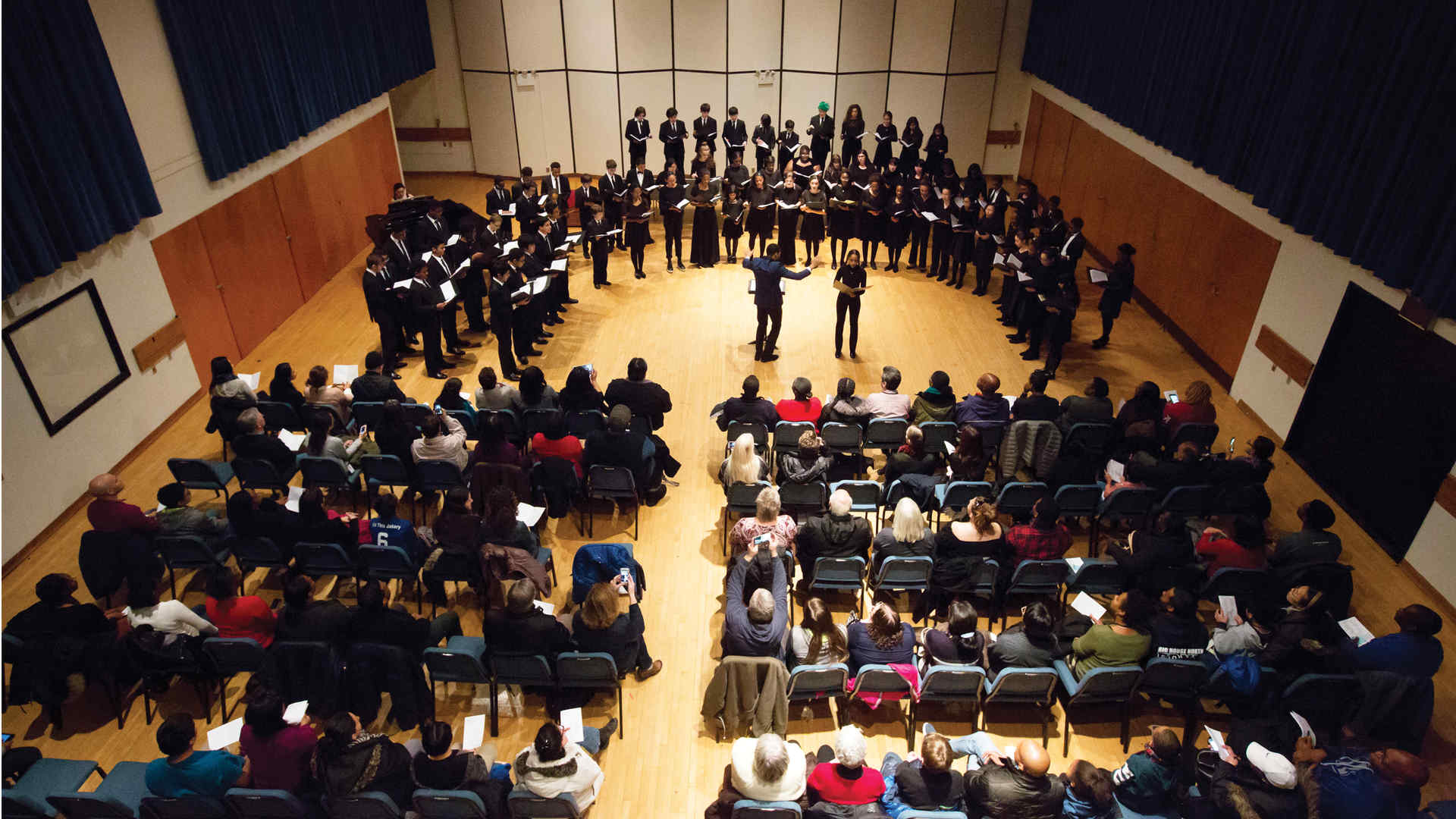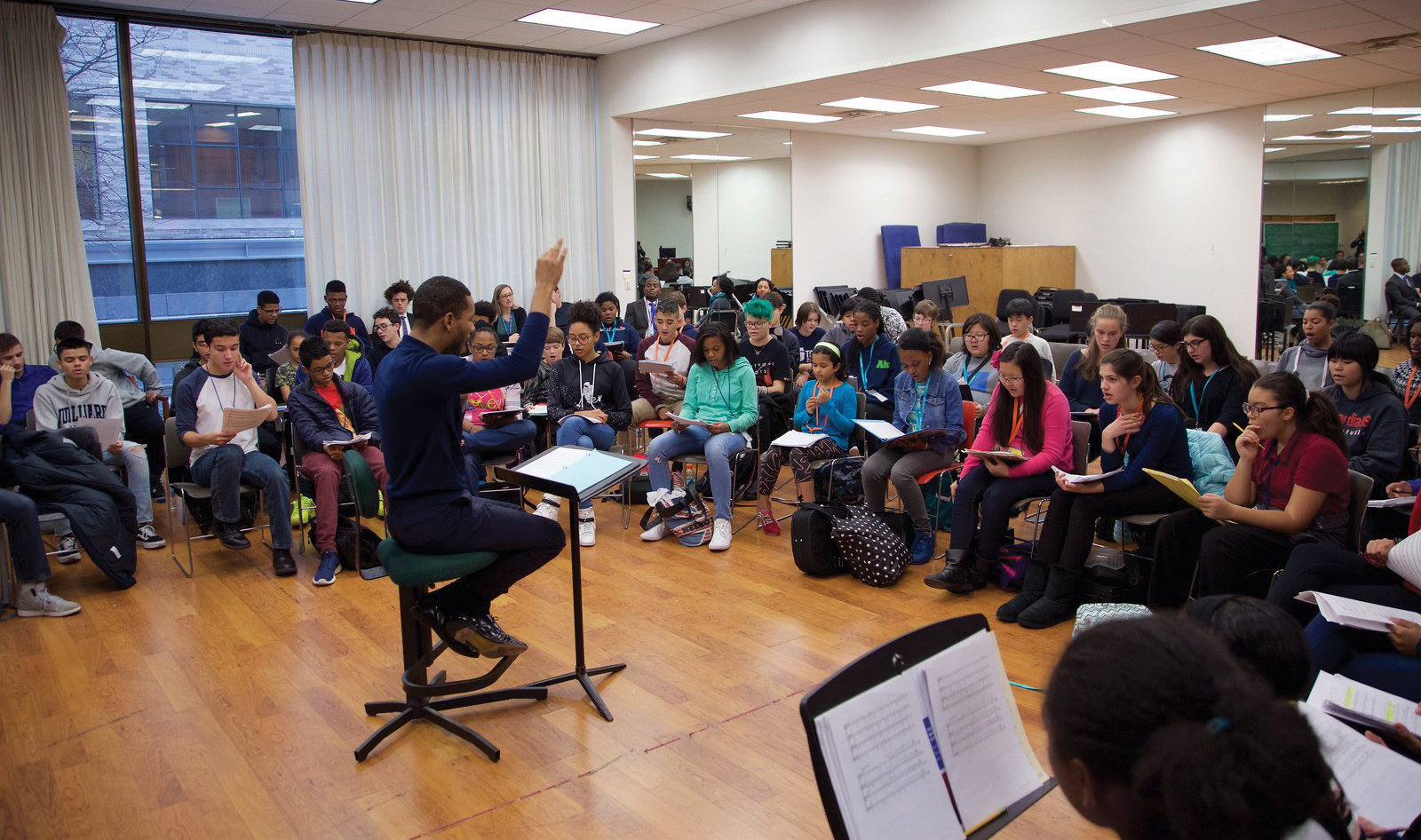
Giving Back: Community Engagement

Fourth-year mezzo-soprano Khady Gueye, a MAP teaching fellow, spoke with Teresa McKinney, director of community engagement, about the program and her ongoing involvement with it. Khady has also been a Gluck fellow and was the president of the Juilliard Black Student Union for the past two years.
Teresa McKinney: What’s your philosophy on community engagement and what does it mean to you as an artist?
Khady Gueye: Community engagement, like art, is about serving something greater than oneself. Both are about addressing a need, though the needs that community service addresses are more tangible—poverty, hunger, etc.—while art addresses the needs of the human condition, that is to say, the human heart. I believe that by sharing myself and my art, I am addressing a vital human need.
TM: How did you decide to get involved in Community Engagement at Juilliard?
KG: At the risk of some discomfort and uncertainty, I wanted to challenge myself to seek out experiences that demand excellence of a different kind: excellence in connecting with people in a way that wasn’t bound to how well I played my instrument. I wanted to experience being in service to something outside of myself. At an elite conservatory like Juilliard, and especially as a classical musician, it’s easy to be solely invested in the aspects of your education that immediately benefit your craft and neglect the experiences that don’t immediately serve your discipline, but contribute to your being well-rounded.
TM: What Community Engagement projects are you working on right now?
KG: This year, the MAP chorus is working on a piece called Music Advances that was commissioned from MAP faculty member Daniel Felsenfeld. It’s fun to see the students’ charisma as they learn how to sing in an ensemble. We’re also working on an arrangement of Debussy’s Nuit d’étoiles for treble voice, and the MAP chorus sounds amazing. It’s interesting to see how these young instrumentalists interpret melodies and pitch differently than a vocalist might.
TM: Tell us about your work as an artist/activist.
KG: As president of the Juilliard Black Student Union [last year and the year before] and throughout my time here, I’ve tried to create platforms for conversations about race at Juilliard and inspire school policies that would help the community become the truly inclusive environment that we all need it to be. I produced two performance/ panel events for MLK Day at Juilliard that were aimed at addressing historical and contemporary racial issues in the U.S. and ultimately uplifting the voices of our black student body. I’ve also participated in meetings with the Juilliard administration and the Student Council where I’ve pushed for reform to school policy and conduct related to students of color, specifically in the area of mental health. With regard to my artistic endeavors, my most recent work (and the work of which I am most proud), was my junior recital, at which I presented a program of art songs all written by black American composers. It’s a passion of mine to uplift the contributions of black classical musicians in my work and to redefine what the classical world considers canon to include the work of black composers and musicians.

TM: How does your community engagement work inform your performance?
KG: My service work teaches me to humble myself and meet my audience where they are rather than expecting them to rise from their seats to make me feel comfortable. In a standard performance setting, the performer is on an elevated platform that places them above the audience, and since the audience members are making an effort to attend, there’s already an expectation that I have something that they must glean from me. Which is to say, it can seem to performers, especially classical musicians, that the responsibility of making a connection with the audience is entirely on the audience. While I understand the reasons behind this mentality, I believe there can and should be more room for negotiating how much effort is to be made to achieve this divine connection, and by whom it is being made. My work in service has shown me that this dynamic is flexible, negotiable, and never to be taken for granted.
TM: Tell us about a memorable Community Engagement experience.
KG: A violinist and I performed at a psychiatric hospital on the Upper East Side. It was a very intimate setting, with about seven feet between us and the patients, and they didn’t immediately take to our musical selections. But then, between pieces, my colleague and I talked with the patients about what we do as musicians, and our experiences as Juilliard students. They then began sharing their musical interests and we took additional requests, ending with “His Eye Is on the Sparrow,” a song that was significant to one of the patients. I believe that it was this ongoing conversation, where we as the performers yielded to the needs of the patients, rather than expecting them as our audience to “get it,” that allowed for a special connection to take place in that hospital. It made for an experience that I would deem spiritual and one that I’ll never forget.
Khady Gueye holds New York Community Trust/Anna Schoen-René, Olia and Michael Zetkin, and Juilliard Opera scholarships